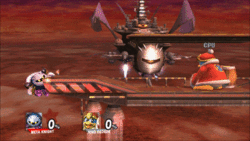Sharking: Difference between revisions
No edit summary |
m (Text replacement - "|thumb|right" to "|thumb") |
||
| Line 1: | Line 1: | ||
{{ArticleIcons|series=y|unofficial=y}} | {{ArticleIcons|series=y|unofficial=y}} | ||
[[File:Sharking Meta Knight Halberd Brawl.gif|thumb | [[File:Sharking Meta Knight Halberd Brawl.gif|thumb|250px|{{SSBB|Meta Knight}} sharking {{SSBB|King Dedede}} on [[Halberd]] in ''Brawl''.]] | ||
'''Sharking''' is the act of going underneath a stage to attack opponents from below. While underneath the stage, a character can attack and/or [[shield damage|damage shields]] relatively safely, while their opponent has few options to counterattack, being unable to pass through the stage floor. However, an experienced player can perform a [[meteor smash]] on a sharker which, if timed correctly, will usually result in an immediate [[KO]]. | '''Sharking''' is the act of going underneath a stage to attack opponents from below. While underneath the stage, a character can attack and/or [[shield damage|damage shields]] relatively safely, while their opponent has few options to counterattack, being unable to pass through the stage floor. However, an experienced player can perform a [[meteor smash]] on a sharker which, if timed correctly, will usually result in an immediate [[KO]]. | ||
Latest revision as of 09:38, April 12, 2023
Sharking is the act of going underneath a stage to attack opponents from below. While underneath the stage, a character can attack and/or damage shields relatively safely, while their opponent has few options to counterattack, being unable to pass through the stage floor. However, an experienced player can perform a meteor smash on a sharker which, if timed correctly, will usually result in an immediate KO.
Sharking can only be performed on stages containing either one-way semisoft platforms (which can only be passed through upwards), such as Delfino Plaza and Halberd, or thin hard platforms, such as Jungle Japes. It is best performed by characters with multiple jumps such as Meta Knight and Kirby, who are better able to recover after attacking.
Sharking has historically been considered a legitimate but risky strategy, because it is easy to make a mistake and self-destruct, especially on stages with hard platforms. Sharking is considered particularly risky in Super Smash Bros. and Super Smash Bros. Melee, due to their faster physics and falling speed than in other games. In Super Smash Bros. Brawl, Meta Knight can shark with ease on many stages, thanks to his very fast and disjointed up aerial, as well having a choice of four quick recovery moves. For this reason, several players consider sharking to be cheap or broken on certain Brawl stages, although others limit this criticism to the Meta Knight character. Until Super Smash Bros. 4, which largely eliminated planking through its new edge mechanics, it was common to see players combine sharking with planking as a way to restore jumps and avoid vulnerability to attacks.
The term 'sharking' directly references sharks, which swim close enough to the surface of the water, so that only their dorsal fins are seen overhead. The technique has been mentioned on the official website for Smash 64 under a name that can be translated as "mole tactics".[1]
Characters that can notably perform sharking[edit]
Stages that allow sharking[edit]
*Indicates that the stage has thin hard platforms instead of semisoft platforms
Super Smash Bros.[edit]
Super Smash Bros. Melee[edit]
- Brinstar
- Great Bay*
- Jungle Japes*
- Kongo Jungle*
- Mute City
- Rainbow Cruise
- Kongo Jungle N64*
- Battlefield*
Super Smash Bros. Brawl[edit]
- 75m
- Brinstar
- Delfino Plaza
- Distant Planet
- Halberd
- Jungle Japes*
- Mario Bros.*
- New Pork City (breakable platform)
- Norfair
- Port Town Aero Dive
- Rainbow Cruise
- Rumble Falls (beginning platform, after first cycle)
- Skyworld*
Super Smash Bros. 4[edit]
- 75m
- Balloon Fight
- Brinstar
- Delfino Plaza
- Distant Planet
- Halberd
- Jungle Japes*
- Kongo Jungle 64*
- Magicant
- Mario Circuit
- Norfair
- Pac-Maze
- Pilotwings
- Port Town Aero Dive
- Prism Tower
- Skyloft
- Skyworld*
- Suzaku Castle (bottom left platform)
- Tortimer Island (long boating dock, unbroken)
- Wuhu Island
Super Smash Bros. Ultimate[edit]
- 75m
- Balloon Fight
- Brinstar
- Delfino Plaza
- Distant Planet
- Halberd
- Jungle Japes*
- Kongo Jungle 64*
- Magicant
- Mario Bros.*
- Mario Circuit
- New Donk City
- New Pork City (breakable platform)
- Norfair
- Pilotwings
- Port Town Aero Dive
- Prism Tower
- Rainbow Cruise
- Skyloft
- Skyworld*
- Suzaku Castle (bottom left platform)
- Tortimer Island (long boating dock, unbroken)
- Wuhu Island
